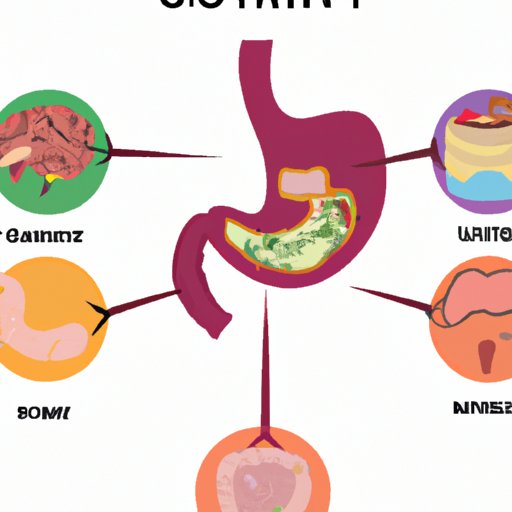Introduction
The human body is an incredibly complex organism composed of many different organ systems that work together in perfect harmony to keep us alive and healthy. One of these important organ systems is the digestive system, which plays a key role in breaking down food, absorbing nutrients, and eliminating waste from the body. While the digestive system is its own distinct system, it is also intricately connected with other organ systems in the body, each playing its part to maintain balance and health.
The purpose of this article is to explore the interconnectedness of the digestive system with other organ systems in the body. We will examine how the digestive system relates to other organ systems, as well as the impact it has on them. By understanding the relationship between the digestive system and other organ systems, we can gain insight into how the body functions as a whole.
Exploring the Interaction Between the Digestive System and Other Systems of the Body
The digestive system is vital to the functioning of the body as a whole. It plays a major role in maintaining balance within the body by breaking down food, absorbing nutrients, and eliminating waste. This process helps to ensure that the body receives the necessary fuel and energy to carry out its daily functions.
The digestive system is closely related to other organ systems in the body. For example, the process of digestion involves the release of hormones that help to regulate metabolism. Additionally, the digestive system produces enzymes that are essential for the breakdown of food. These enzymes are then used by other organ systems in order to extract energy from the food.
Furthermore, the digestive system is responsible for providing the body with essential vitamins and minerals. These nutrients are then used by other organ systems to perform their various functions. Without the digestive system, the body would not be able to obtain the necessary nutrients needed for survival.

Examining the Impact of the Digestive System on Other Bodily Systems
In addition to providing the body with essential nutrients, the digestive system also has a direct impact on other organ systems in the body. Let’s take a look at some of the ways the digestive system affects other organ systems.
Effects on Respiratory System
The digestive system has a direct effect on the respiratory system. The process of digestion requires oxygen, which is obtained through breathing. As the body takes in oxygen during inhalation, the digestive system uses it to break down food and absorb nutrients. Additionally, the digestive system releases carbon dioxide as a byproduct of digestion, which is then exhaled by the lungs.
Effects on Cardiovascular System
The digestive system also has an impact on the cardiovascular system. During the digestion process, the digestive system sends signals to the heart to increase blood flow to the area. This increased blood flow is necessary for the proper absorption of nutrients from food. Additionally, the digestive system releases hormones that help to regulate blood pressure and cholesterol levels.
Effects on Endocrine System
The digestive system also has an effect on the endocrine system. Digestion requires the release of certain hormones, such as insulin and glucagon, which are produced by the endocrine system. These hormones help to regulate the body’s metabolism and energy levels. Additionally, the digestive system releases hormones that help to regulate appetite, hunger, and satiety.
Effects on Nervous System
The digestive system also has a direct effect on the nervous system. During the digestive process, the brain sends signals to the digestive organs to trigger the release of certain hormones and enzymes. This process helps to regulate digestion and ensure that the body obtains the necessary nutrients from food. Additionally, the digestive system releases neurotransmitters that affect mood and can influence mental health.
Conclusion
The digestive system is a vital component of the body’s overall health and wellbeing. It plays an important role in breaking down food, absorbing nutrients, and eliminating waste. Additionally, the digestive system is intricately connected with other organ systems in the body, each playing its part to maintain balance and health. This article explored the interconnectedness of the digestive system with other organ systems, examining the role of the digestive system in maintaining balance within the body and how it affects the respiratory, cardiovascular, endocrine, and nervous systems.
These findings suggest that the digestive system is a critical component of the body’s overall functioning. Without it, the body would not be able to obtain the necessary nutrients or eliminate waste. Furthermore, the digestive system has a direct impact on other organ systems in the body, making it essential for the maintenance of health and wellbeing.
Further research is needed to better understand the relationship between the digestive system and other organ systems in the body. By studying this relationship, we can gain valuable insight into how the body functions as a whole and how to better support its health and wellbeing.
(Note: Is this article not meeting your expectations? Do you have knowledge or insights to share? Unlock new opportunities and expand your reach by joining our authors team. Click Registration to join us and share your expertise with our readers.)
